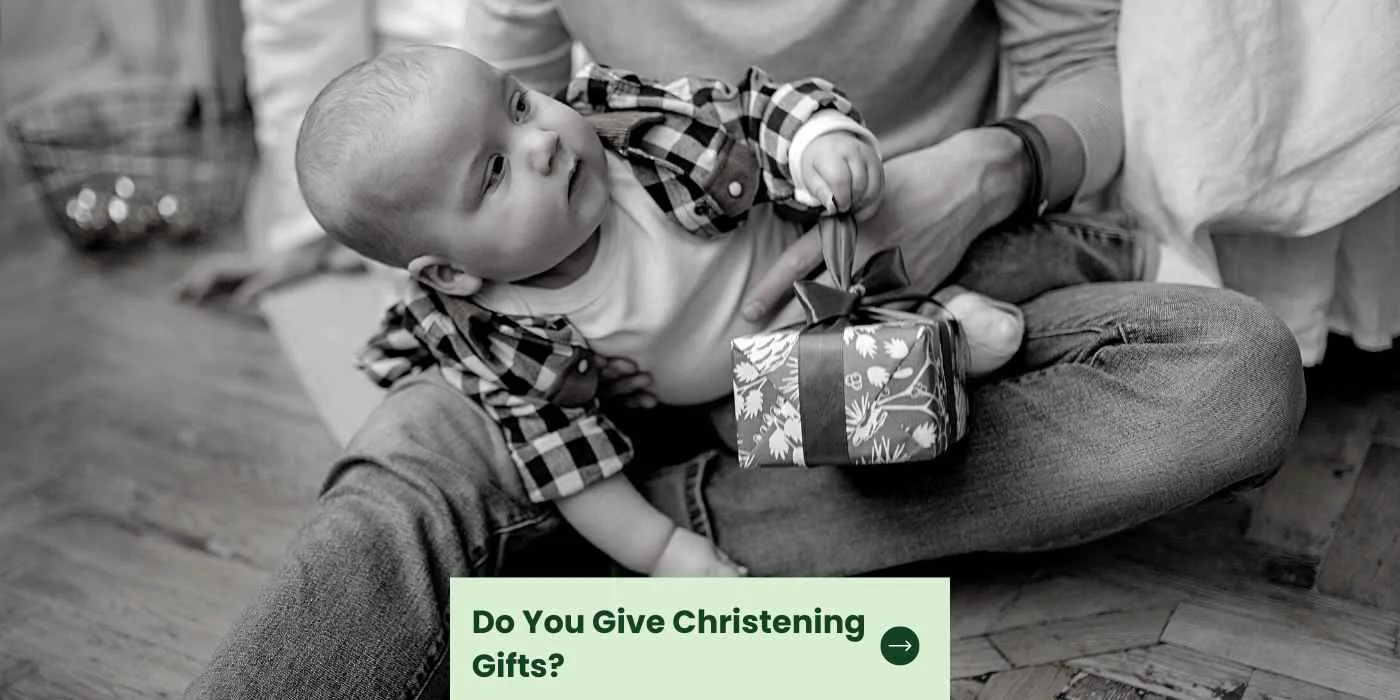The custom of giving christening gifts is a practice steeped in tradition and significance, often leaving guests and family members wondering about the appropriate etiquette.
This article will guide you through the norms and nuances of giving gifts at christenings. We’ll discuss the types of gifts that are traditionally given, the symbolism behind them, and contemporary gift-giving trends. Whether you’re a close family member or a more distant friend of the family, we’ll provide insights into how to choose a meaningful and appropriate christening gift.
Navigating the world of christening gifts doesn’t have to be complicated. With the right information, you can select a gift that honors this special occasion and is cherished for years to come.
Key Takeaways: Christening Gifts
- Giving gifts at a christening is a common practice. Most guests choose to bring gifts to a christening ceremony as a token of love and well-wishes for the child.
- Religious items are popular choices for christening gifts. Items like crosses, Bibles, and religious-themed keepsakes are often given to honor the religious significance of the event.
- Personalized gifts hold sentimental value. Engraved items, custom-made jewelry, or personalized blankets are cherished for their unique and personal touch.
- Educational gifts can be both meaningful and practical. Books, especially children’s Bibles or storybooks with moral lessons, are common and appreciated gifts.
- Savings bonds or financial gifts are thoughtful for the child’s future. These gifts can help contribute towards the child’s education or future expenses.
- Keepsake items create lasting memories. Photo frames, keepsake boxes, or personalized albums are gifts that can be treasured for years.
- Clothing and toys are practical and well-received gifts. While not necessarily religious, they are useful and enjoyable for the child.
- Charitable donations can be made in the child’s name. For families who prefer not to receive physical gifts, a donation to a charity is a meaningful alternative.
What is Christening Gift Etiquette?
Understanding christening gift etiquette can help you choose an appropriate and meaningful gift for this significant occasion. A christening, or baptism, is a momentous event in many families, and the gift you choose should respect the religious and personal significance of the ceremony.
Consider the relationship you have with the child or the family. Close family members and godparents often give more substantial gifts, such as silver keepsakes or religious items. Friends and more distant relatives might opt for smaller, yet still meaningful gifts. The key is to choose something that reflects your connection to the child and family.
In terms of what to give, traditional gifts like silver items, religious keepsakes, or savings bonds are always appropriate. However, you can also consider more practical gifts like clothing or toys, especially if you know they would be appreciated by the family. Personalization, such as engraving or monogramming, can add a special touch to your gift.
It’s also important to respect the family’s religious beliefs and practices. If you’re unsure about what might be appropriate, it’s perfectly acceptable to ask the parents or other close family members for guidance.
Presentation matters too. Take care to wrap the gift tastefully and include a card with a thoughtful message. This shows respect for the occasion and adds to the sentimentality of the gift.
Things to Consider:
- Relationship: Your relationship to the child should guide the significance and size of the gift.
- Appropriateness: Ensure the gift is suitable for the occasion and the family’s beliefs.
- Presentation: A well-presented gift shows thoughtfulness and respect for the occasion.
- Budget: Stick to a budget that feels comfortable for you. It’s the thought and sentiment behind the gift that truly counts, not the price tag.
What are Christening gifts?
Christening gifts are special presents given to a child on the occasion of their christening, a religious ceremony signifying the child’s initiation into the Christian faith. These gifts are typically chosen to honor this important milestone and often hold religious or sentimental significance. The nature of these gifts can vary widely, reflecting both the giver’s relationship to the child and their family’s cultural and religious practices.
A Christening is a welcoming of a child into their (parents) chosen faith. It’s a memorable occasion marking the start of their relationship with God. Godparents are usually chosen (traditionally two of the same sex and one of the opposite sex) who promise to help guide the child through their religious and spiritual development.
It is traditional that after christening a godparent would give the child a gift they can keep for a long time or a monetary gift to start off their savings. Silver gifts have traditionally been popular gifts and gifts such as whiskey or wine that are to be drunk when the child reaches 18 or savings accounts are becoming more popular in modern times.
Beyond the godparents there is no expectation that gifts would be given at a Christening although it is certainly a lovely gesture to want to mark such a memorable occasion. GIfts should be given after the baptism at the reception, and there’s no need for gifts to be so long-lasting meaning toys that will be enjoyed by the baby instantly are just as good as gifts to keep.
Traditional christening gifts often include religious items such as crosses, Bibles, or religious-themed jewelry, symbolizing the child’s spiritual journey. Silver items, like cups, spoons, or picture frames, are also common, revered for their lasting value and the tradition of passing them down through generations.
More contemporary christening gifts can blend traditional symbolism with modern needs and tastes. Personalized items, such as engraved photo frames or custom-made blankets, offer a unique touch. Monetary gifts, like savings bonds or contributions to a college fund, are practical options that provide long-term benefits for the child’s future.
No matter the type of gift, the intention behind a christening gift is to celebrate a significant religious event in the child’s life and to offer something that can be cherished for years to come.
- Symbolism: Choose a gift that has meaningful symbolism in the context of a christening.
- Longevity: Consider whether the gift is something that can be cherished over time, possibly even becoming a family heirloom.
- Personalization: Personal touches can make the gift more special and memorable.
- Cultural and religious sensitivity: Be mindful of the family’s cultural and religious practices when selecting a gift.
Naming Ceremonies Gift Etiquette
Naming ceremonies, often held to celebrate and officially name a newborn, are special occasions that may not have the same religious connotations as christenings but are equally significant. Understanding the etiquette surrounding gifts for these events ensures that your offering is thoughtful and appropriate.
When it comes to gift-giving at a naming ceremony, the emphasis is often on items that are meaningful, useful, or sentimental. Unlike christenings, where gifts often have religious significance, naming ceremony gifts can be more varied and personalized. It’s common to see presents like personalized storybooks, custom artwork for the nursery, or keepsake boxes.
- Choose a Personalized Gift: Personalized gifts, like a custom blanket or a named storybook, show thoughtfulness and care.
- Opt for Longevity in Gifts: Select items that grow with the child, such as savings bonds or educational toys, to provide lasting value.
- Respect Cultural Norms: Be aware of and sensitive to the cultural practices and traditions associated with naming ceremonies in different cultures.
- Consider Practicality: Practical gifts like baby essentials are always appreciated by new parents for their usefulness.
- Stay Within Your Budget: Select a gift that is comfortable for your budget; it’s the thought that counts, not the price tag.
- Include a Heartfelt Note: Adding a personal note with your gift adds an emotional touch, making it more memorable.
- Be Mindful of Family Preferences: If the family has specific needs or preferences, such as eco-friendly products, it’s important to take these into account.
- Gift Presentation Matters: Nicely wrapped gifts with attractive packaging enhance the gift-giving experience.
- Check for Gift Registries: If available, buying from a registry ensures you give something the family really needs or wants.
- Consider Group Gifting Options: Joining with others for a larger gift can be a thoughtful way to contribute to something significant.
For those closer to the family, more substantial gifts such as savings bonds or contributions to the child’s future education fund are thoughtful choices. These gifts show a long-term commitment to the child’s well-being and future.
Practical gifts, like clothing, toys, or baby gear, are also well-received, especially if they align with the family’s needs or preferences. However, it’s important to consider the parents’ lifestyle and taste when selecting these items.
As with any gift-giving occasion, the presentation of the gift is important. Choose tasteful wrapping and include a card with a personalized message to the child or family. This shows that you have put thought and care into your gift.
- Personalization: Tailored gifts add a special touch to the occasion.
- Practicality: Useful items that align with the family’s needs are often appreciated.
- Long-term value: Consider gifts that the child can appreciate now or in the future.
- Respect for family preferences: Be mindful of the family’s style and any specific needs or preferences they might have.
FAQs on do you bring a gift to a christening
Is it customary to buy a christening gift?
Yes, it is customary to buy a christening gift. This practice is a way of celebrating the special occasion and showing support for the child and their family. Gifts often carry religious or sentimental significance, symbolizing good wishes for the child’s future. The type of gift can vary based on cultural traditions, personal preferences, and the relationship with the family.
How much should you give for a christening gift?
The amount to spend on a christening gift varies based on personal budget and relationship to the child. Typically, closer family members might spend more, ranging from $50 to $150 or more, while friends or distant relatives might spend between $25 and $50. The focus should be on the thoughtfulness of the gift rather than its cost.
What is the traditional gift for a christening?
The traditional gift for a christening is often a silver item, like a spoon, cup, or rattle. Silver has long been associated with purity, wealth, and good fortune, making it a meaningful choice for such an occasion. These gifts are not only elegant but also serve as lasting keepsakes that can be treasured for years to come.
What is a common christening gift?
Common christening gifts include items like silver spoons, cups, or jewelry, as well as religious items like crosses or bibles. Personalized gifts, such as engraved photo frames, blankets, or keepsake boxes, are also popular. Some may choose to give monetary gifts, like savings bonds or contributions to a college fund, to invest in the child’s future.










